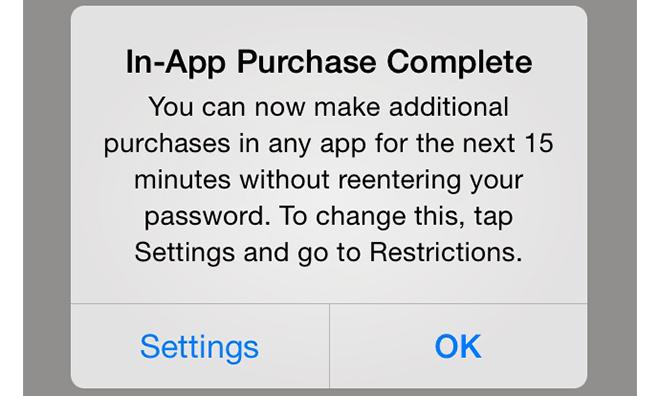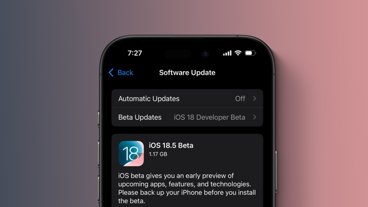Apple's recently-released iOS 7.1 update now shows a pop-up warning message for users making in-app purchases for the first time, reminding them of a 15-minute grace period in which additional purchases can be made without reentering password.
As seen above, the iOS 7.1 update's informational message, which informs users of Apple's in-app content policies, is displayed after completing an initial purchase.
The pop-up offers direct access to iOS device Settings, where users can apply in-app purchase limitations, including an option to require passwords for every buy. Alternatively, users can turn off in-app purchasing altogether.
While the 15-minute no-password window has been in effect since the iOS App Store launched in 2008, some users may not be aware of the policy. Apple recently settled a lawsuit leveled by the U.S. Federal Trade Commission over the company's implementation of in-app purchasing. The government body argued that the current system made it too easy for children to make purchases without parental consent.
In 2013, Apple came under fire for the supposedly lax App Store policies. One high-profile case involved an 8-year-old British girl who managed to charge over $6,000 to her father's account with content bought through so-called "freemium" apps. Apple refunded the money.
Under the FTC settlement terms, Apple will refund some $32.5 million to parents whose children made unauthorized purchases. In addition, Apple agreed to change how the App Store operated to ensure purchases are being made from legitimate account holders. A report last week claimed the company was having technical difficulties in implementing the modifications, however, as the Mar. 31 settlement deadline approaches.
 AppleInsider Staff
AppleInsider Staff








 Wesley Hilliard
Wesley Hilliard
 Marko Zivkovic
Marko Zivkovic

 Christine McKee
Christine McKee
 Amber Neely
Amber Neely

 Malcolm Owen
Malcolm Owen








20 Comments
FTC is only claiming the credit for doing nothing and Apple on the record wanted to settle with those affected by this 15 minute download without any need to key in the password way before any action taken by the FTC.
The real fix is to reverse the preference setting for what that dialog talks about. By default, you need to enter the password every time, and going to settings, you can increase the delay before needing to enter the password. But that would slightly reduce how much money Apple makes.
Apple should counter-sue negligent parents.
I blame parents for punching in a credit card number, not stopping to think about whether they themselves even understand the system, and then handing an Internet-connected device to small children unsupervised. That said, anyone can make a mistake, and a change to reduce mistakes is a good change. Necessary? Well, how many other mistakes can one make with an Internet device and Apple services? Should Apple warn you if you enter a phone number into a web form to "be sure you are not accidentally sharing personal info on a public forum"? Should iTunes Radio start with a warming that a loud song might follow a quiet song, damaging hearing if used with speakers/headphones set very loud? So I can't see this change as necessary, and I don't see the FTC connection. But it's still a good thing! Is the FTC giving Google the same March deadline? How is Google doing getting a fix out to their users? Because Android's problem is actually worse: a 30-minute window.
The real fix is to reverse the preference setting for what that dialog talks about. By default, you need to enter the password every time, and going to settings, you can increase the delay before needing to enter the password.
But that would slightly reduce how much money Apple makes.
In a world of Capitalism, Apple at least has some semblance of responsibility to customers and the environment. Whether it is reimbursing people for their own negligence of not monitoring their kids, or whether it is building products that are user friendly and have great accessibility options, or whether it is trying to reduce their carbon footprint.
To paraphrase Tim Cook, they do some things without worrying about the bloody ROI.